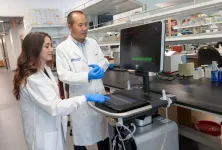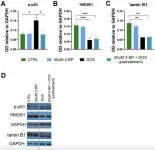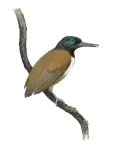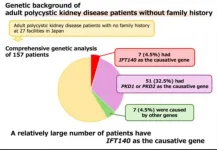(Press-News.org) Humans, livestock and companion animals benefit from virus-based vaccines and gene therapies, but crops do not. This paradox is highlighted by an international research group led by the Institute of Molecular and Cellular Biology of Plants (IBMCP) within the Spanish National Research Council (CSIC), in an article published in the prestigious journal Nature Reviews Bioengineering. The study proposes a roadmap to use attenuated viruses to enhance performance of crops, making them more resistant to extreme and changing climate conditions, or to produce dietary supplements for improved human nutrition. According to the authors, this is a more efficient and sustainable alternative to agrochemicals and faster than traditional breeding methods.
The article is part of the “Future of Food” collection, where the leading journals Nature Reviews Bioengineering and Nature Food discuss technological progress and opportunities of engineered food technologies. “Our article presents thought-provoking viewpoints and confronts readers with paradoxical situations” reveals Fabio Pasin, a CSIC researcher at the IBMCP and lead author of the study. The authors propose that viral vectors, based on attenuated viruses that do not harm plants, could be used to introduce specific genes into crops, thus improving their agronomic traits. These viral vectors could be used to induce plant flowering and accelerate harvests; develop improved crop varieties; modify plant architecture to facilitate mechanization; improve drought tolerance; or produce metabolites beneficial to human health, among other applications.
Using attenuated viruses might be the best way to achieve desired plant traits. “Imagine using a computer that isn’t connected to the internet, and every time you need a software update, you have to buy a new computer”, illustrates Dr. Pasin. “Well, our idea is to use a virus like a USB stick: you connect it to the computer, install updates, and continue using it”, he explains. “These vectors can be used for precise genome editing through CRISPR-Cas components to achieve heritable improvements in agronomic traits, such as grain length and weight in wheat or fruit color in tomatoes”, explains Dr. Pasin. “Additionally, viral vector applications allow for temporary improvements, offering an attractive alternative, due to their rapid development and validation, to the use of agrochemicals for more efficient and sustainable agricultural production systems”, assures the CSIC researcher.
Humans, Livestock, and Pets, but Not Plants
Despite these advantages, the authors point out several paradoxes: it is considered safe to administer recombinant viruses for human (e.g., against COVID-19) and veterinary vaccination, yet no agricultural use is registered. Humans and domestic animals can benefit from gene therapies based on recombinant viruses, but crops cannot. Recombinant viruses can be released into the environment to immunize wildlife like foxes, raccoons, or coyotes, thereby controlling rabies in Europe and the United States, but their agricultural use is still not authorized, not even in highly confined environments.
What Is Needed to Implement It?
Given the advantages, could this new technology be implemented in crops? One obstacle is regulatory issues. In a transient delivery approach, which would allow the use of viral vectors for immediate plant improvements, scientists see a certain gap. “It's a new type of product, similar to an agrochemical, but being biological, there is currently nothing equivalent on the market for agricultural use, so we have no precedents and a thorough analysis by authorities would be needed”, explains Dr. Pasin. This process could be expedited by using recombinant viruses that implement methods to ensure biocontainment and by prioritizing crops used for animal feed, textile fibers, biofuels, or ornamental purposes, he argues.
Research at CSIC
In plants, viral vector technology is in an advanced research phase and its effectiveness has been demonstrated under experimental conditions. At CSIC, researchers optimize technological platforms to accelerate the development and validation of agricultural applications based on viral vectors, implementing synthetic biology approaches compatible with future industrial-scale production. Additionally, they explore the use of viral vectors to improve the agronomic characteristics of crops, such as tomatoes.
CSIC communication
END
About The Study: In 2023, all 3 payer markets (commercial insurance, Medicare Part D, and Medicaid managed care) for pharmacy benefit manager (PBM) services were highly concentrated, but concentration varied and was highest in Medicare Part D. While CVS Caremark held the dominant share in all 3 payer markets, each of the PBMs appeared focused on a different payer: Express Script’s largest share was in the commercial market, while Optum Rx’s and CVS Caremark’s were in Medicare Part D and Medicaid ...
New research published in NEJM and presented at this year’s Annual Meeting of the European Association for the Study of Diabetes (EASD) in Madrid (9-13 Sept) shows that a new class of insulin that is injected once a week is as effective as daily insulin injections for effective and safe blood sugar management in patients with type 2 diabetes. The study is by Dr Carol Wysham, MultiCare Rockwood Center for Diabetes and Endocrinology, Spokane, WA, USA, and colleagues.
When patients with type 2 diabetes find their oral medications alone can no longer control their blood sugar, insulin therapy is added and injection frequency (having daily injections) is among the main factors that can contribute ...
New research published in The Lancet and presented at this year’s Annual Meeting of the European Association for the Study of Diabetes (EASD) in Madrid (9-13 Sept) shows that a new class of insulin that only needs to be injected once weekly is as effective as daily insulin injections for effective blood sugar management in patients with type 1 diabetes. However, higher rates of hypoglycaemia using the new class means vigilance is needed for dose initiation and optimisation. The study is by Dr Richard M Bergenstal, ...
RIVERSIDE, Calif. -- When they become fathers, men who have an unhealthy, high-cholesterol diet can cause increased risk of cardiovascular disease, or CVD, in their daughters, a University of California, Riverside-led mouse study has found.
The research, published in the journal JCI Insight, is the first to demonstrate this result seen only in female offspring.
CVD, the leading cause of death globally, is a group of disorders that affects the heart and blood vessels. Hypertension (high blood pressure) is a leading risk factor ...
“For the first time, the present study revealed a critical role for protein palmitoylation in the development of a DNA damage-induced senescence phenotype.”
BUFFALO, NY- September 10, 2024 – A new research paper was published in Aging (listed by MEDLINE/PubMed as "Aging (Albany NY)" and "Aging-US" by Web of Science), Volume 16, Issue 16 on August 23, 2024, entitled, “2-Bromopalmitate treatment attenuates senescence phenotype in human adult cells - possible role of palmitoylation.”
As ...
For paleontologists who study animals that lived long ago, fossilized remains tell only part of the story of an animal’s life. While a well-preserved skeleton can provide hints at what an ancient animal ate or how it moved, irrefutable proof of these behaviors is hard to come by. But sometimes, scientists luck out with extraordinary fossils that preserve something beyond the animal’s body. Case in point: in a new study published in the journal Current Biology, researchers found fossilized seeds in the stomachs of one of the earliest birds. This discovery shows that these birds were eating ...
In a new study published in JAMA Network Open, researchers at Thomas Jefferson University have developed a novel screening tool to measure digital health readiness, which will be critical in addressing barriers to telehealth adoption among diverse patient populations.
The COVID-19 pandemic facilitated many rapid changes in healthcare, including a shift to using telehealth services across the U.S. instead of traditional in-person doctor’s visits. This ensured that patients continued to receive vital care, while only needing access to a mobile device or computer with a webcam. But just because a ...
For more information, contact:
Nicole Fawcett, nfawcett@umich.edu
EMBARGOED for release at 11 a.m. Sept. 10, 2024
New law regulating out-of-pocket drug spending saves cancer patients more than $7,000 a year, study finds
The Inflation Reduction Act’s limit on Medicare Part D spending leads to significant savings for patients prescribed oral chemotherapy
ANN ARBOR, Michigan — As prescription oral chemotherapies have become a common form of cancer treatment, some patients were paying more than $10,000 a year for medications. A new study ...
About The Study: In this modeling study of racial and ethnic disparities of tuberculosis (TB), these disparities were associated with substantial future health and economic outcomes of TB among U.S.-born persons without interventions beyond current efforts. Actions to eliminate disparities may reduce the excess TB burden among these persons and may contribute to accelerating TB elimination within the U.S.
Corresponding Author: To contact the corresponding author, Nicole A. Swartwood, MSPH, email nswartwood@hsph.harvard.edu.
To ...
Tokyo Medical and Dental University (TMDU) researchers uncover the genetic link in patients with polycystic kidney disease lacking family history
Tokyo, Japan – Polycystic kidney disease (PKD) is an intractable disorder that causes fluid-filled cysts to grow in the kidneys. It is typically seen in adults. As one of the most prevalent hereditary kidney diseases, the autosomal dominant form of PKD is usually caused by mutations in the PKD1 and PKD2 genes. However, one out of ten patients with this condition typically exhibit no family history of the disease and lack ...



